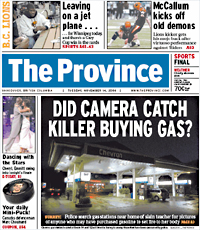
British Columbia is the westernmost province of Canada. Situated between the Pacific Ocean and the Rocky Mountains, the province has a diverse geography, with rugged landscapes that include rocky coastlines, sandy beaches, forests, lakes, mountains, inland deserts and grassy plains. British Columbia borders the province of Alberta to the east; the territories of Yukon to the north; the Northwest Territories to the northeast; the US states of Washington, Idaho and Montana to the south; and Alaska to the northwest. With an estimated population of over 5.5 million as of 2023, it is Canada's third-most populous province. The capital of British Columbia is Victoria, while the province's largest city is Vancouver. Vancouver and its suburbs together make up the third-largest metropolitan area in Canada; with the 2021 census recording 2.6 million people in Metro Vancouver.
Chinook Jargon is a language originating as a pidgin trade language in the Pacific Northwest. It spread during the 19th century from the lower Columbia River, first to other areas in modern Oregon and Washington, then British Columbia and parts of Alaska, Northern California, Idaho and Montana while sometimes taking on characteristics of a creole language. It is partly descended from the Chinook language, upon which much of its vocabulary is based. Approximately 15 percent of its lexicon is French, and it also makes use of English loanwords and those of other language systems. Its entire written form is in the Duployan shorthand developed by French priest Émile Duployé.

The Province is a daily newspaper published in tabloid format in British Columbia by Pacific Newspaper Group, a division of Postmedia Network, alongside the Vancouver Sun broadsheet newspaper. Together, they are British Columbia's only two major newspapers.

Oregon Country was a large region of the Pacific Northwest of North America that was subject to a long dispute between the United Kingdom and the United States in the early 19th century. The boundaries of the area, which had been created by the Treaty of 1818 without recognizing indigenous claims to the area, consisted of the land north of 42° N latitude, south of 54°40′ N latitude, and west of the Rocky Mountains down to the Pacific Ocean and east to the Continental Divide. Article III of the 1818 treaty gave joint control to both nations for ten years, allowed land to be claimed, and guaranteed free navigation to all mercantile trade. However, both countries disputed the terms of the international treaty. Oregon Country was the American name while the British used Columbia District for the region. Meanwhile, Indigenous nations had lived in the area since time immemorial, though with little legal recognition in the American and British legal systems. Evidence along the Salmon River shows people lived there at least 16,000 years ago, and may have populated the continent after migrating along the Pacific Coast, then following up the Columbia River into the interior.
The Georgia Straight is a free Canadian weekly news and entertainment newspaper published in Vancouver, British Columbia, by Overstory Media Group. Often known simply as The Straight, it is delivered to newsboxes, post-secondary schools, public libraries and a large variety of other locations.

The history of British Columbia covers the period from the arrival of Paleo-Indians thousands of years ago to the present day. Prior to European colonization, the lands encompassing present-day British Columbia were inhabited for millennia by a number of First Nations.

John Deighton, better known as "Gassy Jack", was a bar-owner in British Columbia. The Gastown neighbourhood of Vancouver, British Columbia takes its name from him.
Vancouver South is a federal electoral district in British Columbia, Canada, that has been represented in the House of Commons of Canada from 1917 to 1997, and since 2004. It covers the southern portion of the city of Vancouver, British Columbia.

CIVT-DT is a television station in Vancouver, British Columbia, Canada, serving as the West Coast flagship of the CTV Television Network. It is owned and operated by network parent Bell Media alongside Victoria-based CTV 2 station CIVI-DT. Although the two stations nominally maintain separate operations, the Victoria station's newscasts have been produced at CIVT-DT since 2023. CIVT-DT's studios are located at 969 Robson Street at the intersection of Robson Street and Burrard Street in downtown Vancouver, which also houses the British Columbia operations of the CTV network itself, including the CTV National News Vancouver bureau. The station's transmitter is located atop Mount Seymour in the district municipality of North Vancouver.
Payolas was a Canadian rock band that was most prominent in the 1980s.
KVOS-TV is a television station in Bellingham, Washington, United States, broadcasting the digital multicast network Heroes & Icons. It is owned and operated by Weigel Broadcasting alongside Seattle-licensed MeTV station KFFV, channel 44. While KVOS-TV is nominally part of the Seattle–Tacoma market, it can be characterized as a border blaster, as it primarily serves an audience in southwestern British Columbia, Canada, including Vancouver and Victoria.
The Conseil scolaire francophone de la Colombie-Britannique is the French-language school board for all French schools located in British Columbia. Its headquarters are in Richmond in Greater Vancouver. Unlike the other school boards in British Columbia, this school board does not cover a specific geographic area, but instead takes ownership of schools based solely on language.

Adrian Dix is a Canadian politician serving as the current Member of the Legislative Assembly (MLA) for Vancouver-Kingsway in British Columbia. In addition to serving as the current Member of the Legislative Assembly (MLA) for Vancouver-Kingsway in British Columbia, Dix is also serving as the current Minister Responsible for Francophone Affairs in British Columbia and the current Minister of Health in British Columbia. He has also served as the leader of the British Columbia New Democratic Party from 2011 to 2014. He was first elected to the Legislative Assembly of British Columbia in the 2005 provincial election. Dix's decision in 2013 to be replaced as leader came following the party's disappointing result in the May 2013 provincial election which the BC NDP lost despite a 20-point lead in the polls prior to the election campaign.

CKKS-FM is a radio station licensed to Chilliwack, British Columbia and serving Greater Vancouver and the Fraser Valley. Owned by Rogers Radio, a division of Rogers Sports & Media, it broadcasts a modern rock format.
The Greater Vancouver Board of Trade (GVBOT) is a non-profit organization. It serves Vancouver, British Columbia, Canada, in a fashion similar to the Board of Trade or Chamber of Commerce. The Board is the largest business association between Victoria and Toronto, participating in activities such as engaging in advocacy to impact public policy at all levels of government, facilitating networking opportunities, and providing professional development resources for its members.

The Prince George Citizen is a weekly newspaper located in Prince George, British Columbia, Canada. It is owned by Glacier Media.

Multiculturalism in Canada was officially adopted by the government during the 1970s and 1980s. The Canadian federal government has been described as the instigator of multiculturalism as an ideology because of its public emphasis on the social importance of immigration. The 1960s Royal Commission on Bilingualism and Biculturalism is often referred to as the origin of modern political awareness of multiculturalism, resulting in Canada being one of the most multicultural nations in the world. The official state policy of multiculturalism is often cited as one of Canada's significant accomplishments, and a key distinguishing element of Canadian identity and Canadian values.
South Asian Canadians in Metro Vancouver are the third-largest pan-ethnic group in the region, comprising 369,295 persons or 14.2 percent of the total population as of 2021. Sizable communities exist within the city of Vancouver along with the adjoining city of Surrey, which houses one of the world's largest South Asian enclaves.
The history of Chinese Canadians in British Columbia began with the first recorded visit by Chinese people to North America in 1788. Some 30–40 men were employed as shipwrights at Nootka Sound in what is now British Columbia, to build the first European-type vessel in the Pacific Northwest, named the North West America. Large-scale immigration of Chinese began seventy years later with the advent of the Fraser Canyon Gold Rush of 1858. During the gold rush, settlements of Chinese grew in Victoria and New Westminster and the "capital of the Cariboo" Barkerville and numerous other towns, as well as throughout the colony's interior, where many communities were dominantly Chinese. In the 1880s, Chinese labour was contracted to build the Canadian Pacific Railway. Following this, many Chinese began to move eastward, establishing Chinatowns in several of the larger Canadian cities.
Chinese Canadians are a sizable part of the population in Greater Vancouver, especially in the Chinese communities in the city of Vancouver and the adjoining suburban city of Richmond. The legacy of Chinese immigration is prevalent throughout the Vancouver area.








